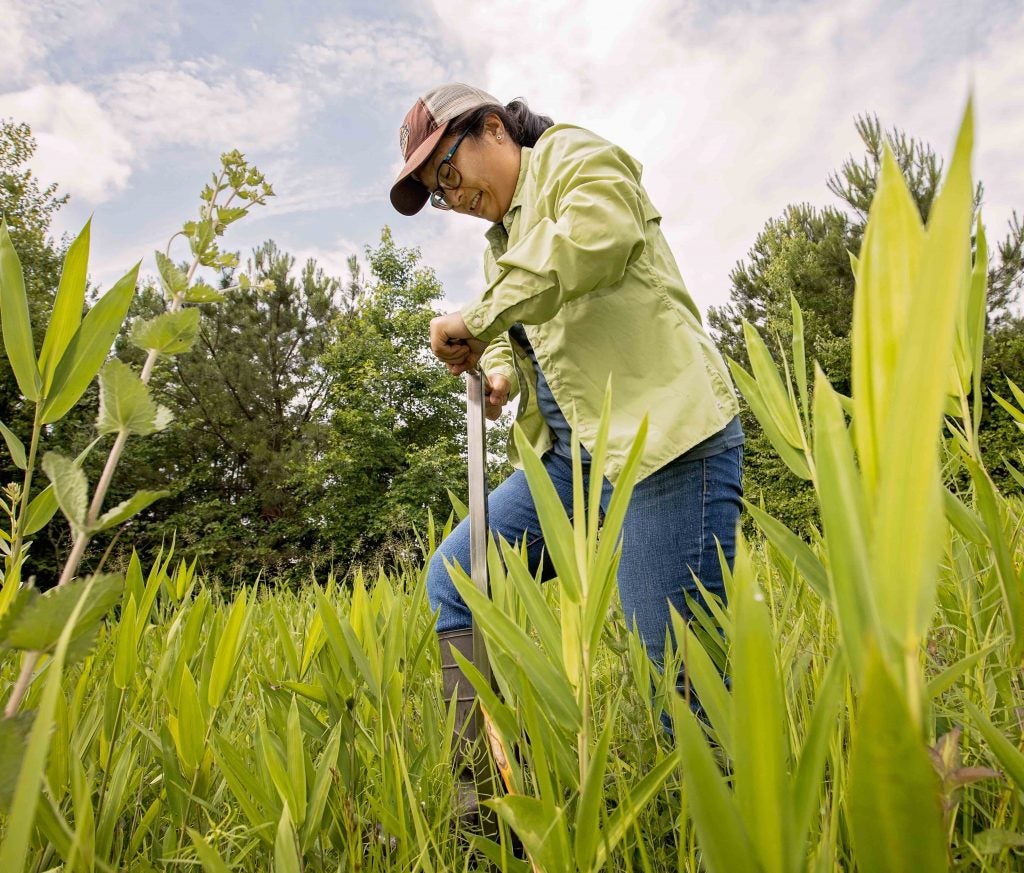CAREER ACHIEVEMENT
ECU assistant professor awarded prestigious NSF grant
An East Carolina University assistant professor turned in her bass guitar for a soil probe to rock out with microbes.
The unconventional move from rocker to scientist paid off for microbial ecologist Ariane Peralta who was awarded a Faculty Early Career Development Program (CAREER) grant from the National Science Foundation’s Division of Environmental Biology Ecosystem Science Cluster.
The five-year award, valued at $598,852, is the most prestigious NSF award supporting early-career faculty researchers. CAREER awards fund projects that not only provide value through research, but also have strong educational and outreach components. Peralta’s project will combine these elements by examining the effect of fossil fuel particulates on wetlands.
Peralta, who’s entering her sixth year at ECU this fall, was once a member of the Illinois-based rock band The Beauty Shop. Signed to a label in the United Kingdom but pursuing her master’s degree in the United States, she eventually made a tough choice.
“You really have to take a look at things when you’re waiting to play a gig and you’re sitting at the bar reading research papers,” Peralta said. “I finally said, ‘I need to pick a focus.’ It was a tough choice, but I’m doing what I love.”
A mentor introduced Peralta to the world of soil ecology and a shovel. From there, she dug her own path forward.

Peralta’s project examines the function of microbes in wetlands, particularly how they help wetlands store carbon.
“I’m most excited about the opportunities I’m going to be able to provide our students to engage in science and be scientists,” Peralta said. “I didn’t see myself as a microbial ecologist, but then I discovered that you could explore the world around you, dig up soil, sample water, and study how organisms interact with their environment. You never know until you try and that’s something I’m proud and excited to support through the award.”
Peralta’s study focuses on North Carolina’s wetlands. Wetlands are known in the scientific community as carbon sinks – parts of the environment that have the ability to store excess carbon from the atmosphere. Maintaining carbon sinks can help offset or mitigate the ever-increasing greenhouse gas production from human activities, but this ecosystem benefit can be affected when non-naturally occurring elements are introduced to the environment.
As a consequence of fossil fuel use and other land use changes, particulates – including nitrogen and phosphorus – can be deposited from the atmosphere onto wetland ecosystems. Peralta hypothesizes that these elements may affect the microbes living in wetland soil, causing them to release more carbon into the atmosphere. The more carbon released by wetland microbes and the less carbon stored in soils and plants, the less effective wetland habitats are at storing greenhouse gases.
“Scientists generally view wetlands as great ecosystems for carbon storage, but we may be overestimating how much carbon they’re storing because we don’t examine how the microbes interact with the soils and plants in the ecosystem,” Peralta said. “The fertilization effect from increased nitrogen and phosphorus particulates may affect microbial structure and function.
“We need to study how wetlands are functioning so we can better predict how these important ecosystems are responding climate change,” she said. “Ultimately, it is important that we accurately account for coastal wetland carbon storage ability.”
Peralta said exploring how fertilization nutrients are affecting wetlands is one of the keys to protecting the region’s biodiversity.
“The wetlands in eastern North Carolina act like the state’s kidneys,” she said. “They can filter out harmful toxins, pathogenic bacteria, and excess nutrients that affect our water quality. They also provide essential habitat for many organisms, offer flood protection, and are economic drivers in this part of the state.”
The project also serves as a course-based undergraduate research experience for students. These experiences, also known as CUREs, provide a way for students to engage in research projects within the classroom. Peralta said both undergraduate and graduate students will work on the study, from taking soil samples at ECU’s West Research Campus to sequencing microbial communities and measuring greenhouse gases in wetlands.
Peralta’s field work will be conducted at a long-term ecology experiment started by associate professor Carol Goodwillie in 2004 as a plant ecology CURE.
“It’s great when research at ECU provides new academic knowledge, but we’re really living up to our service motto when we provide our students and community members opportunities to participate in the process,” said Jay Golden, ECU vice chancellor for research, economic development and engagement. “Dr. Peralta’s CAREER award puts a spotlight on a vital North Carolina ecosystem and prepares a new generation of scientists at the same time. We’re proud of the work she’s doing.”
Learn more about Peralta’s research online.
